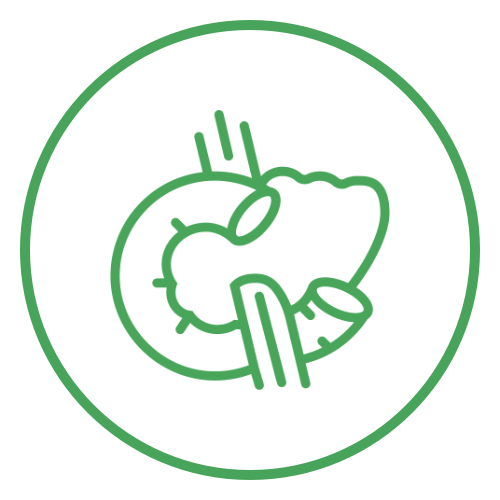Pancreatitis
The pancreas is a gland that sits behind the stomach; it is larger than your gallbladder but smaller than your liver. It plays a vital role in the digestive system: it secretes digestive juices (such as enzymes and sodium bicarbonate) into the small intestine and produces the hormones (insulin and glucagon) that control your body’s ability to use sugar. These digestive substances also split fats, proteins, and carbs into digestible molecules.
What Is Pancreatitis?
Pancreatitis is inflammation of the pancreas. This condition usually begins acutely and in some cases may become a severe issue after recurrent attacks. When the pancreas becomes inflamed, the digestive enzymes attack the tissue that produced them; this results in tissue damage and bleeding and can cause the pancreas blood cells and vessels to swell. Chronic pancreatitis can result in endocrine failure, a case in which the enzymes that are necessary for your body to digest and absorb nutrients are no longer produced and insulin is no longer produced. Although acute pancreatitis is not fully understood, it is known among the medical community to be caused by gallstones or alcohol abuse. Acute pancreatitis can be treated with a short hospital stay, and affects about 80,000 Americans each year. Chronic pancreatitis is more persistent and typically occurs more often in men than in women.
What Are The Symptoms Of Pancreatitis?
- A gradual or sudden severe pain in the center part of the upper abdomen that goes through to your back; this pain may get worse when you eat and builds to a persistent pain
- Nausea and vomiting
- Fever
- Jaundice (a yellowing of the skin) due to blockage of the bile duct from the inflamed pancreas
- Shock
- Weight loss
- Symptoms of diabetes mellitus
If your abdominal pain lasts for more than 20 minutes, call your doctor or go to the emergency room. Your doctor will review your medical history, your drinking history, and draw blood to test for pancreatic enzymes. You may also need to take one or more of the following tests: (1.) a pancreas function test to determine the loss of pancreatic enzymes, (2.) a fecal fat collection test to ascertain malabsorption, or (3.) an ultrasound or CT scan to determine pancreas damage.
What Is The Treatment For Pancreatitis?
Your doctor is most likely to focus treatment on metabolic and nutritional needs and relieving pain. Mild pain can be treated with analgesics whereas if gallstones are causing acute pancreatitis, then you may have to have your gallbladder removed to prevent further attacks. If the bile duct is enlarged you may need an ERCP to drain it. You will also be given dietary guidelines to follow in order to reduce the amount of fat you eat since your body will have trouble digesting these types of substances. You may also need to take pancreatic enzyme supplements, which will help you absorb food and regain some of the weight that was lost.
To prevent pancreatitis from occurring again, avoid fatty foods, such as butter and fried eggs that can cause gallstones, and stop drinking alcohol if that was the cause.

